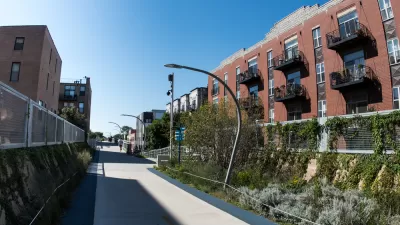In fact, that's putting it positively, as the battle may already have been lost according to House Transportation Chair John Mica. Enhancements, most of which fund pedestrian and bicyle projects, may become voluntary rather than a requirement.
"The question is this: With the nation facing a transportation crisis that has gotten little attention outside of policy wonks and Washington, should the federal government continue to mandate that states spend federal dollars on pedestrian safety, bicycling trails, landscaping and historic preservation?"
Readers may recall that this issue - the requirement that states and metropolitan transportation organizations include funding for transportation enhancements - that also include landscaping by freeways and transportation museums, making the entire enhancement program an attractive target by some, was targeted by Sen Tim Coburn (R-OK) who held up the extension of transportation funding bill, threatening to end collection of the federal gas tax come Sept. 30.
"House Transportation Committee Chair Mica (R-Fla.) said (enhancements) won't be included in the long-term (transportation) funding bill he expects to produce this fall. And Coburn said he has received assurances on the Senate side that the spending will be made optional rather than mandatory.
"The federal transportation enhancement program governed the spending of $927.5 million federal dollars in fiscal 2011, about 2 percent of the total $40.2 billion highway budget.
"This program has been the lifeblood of the nation's trails, biking and walking programs," said Kevin Mills, vice president of the Rails-to-Trails Conservancy. "It's wildly popular across the country."
Outside of enhancements, there appears to be harmony between the House and Senate approaches to reauthorization of the transportation funding bill.
From Republicans pitch transportation construction bill as major, bipartisan jobs program": "Their support for higher funding levels is a very positive thing," Sen. Barbara Boxer, (chair of the Environment and Public Works Committee) said in an email. "I am confident that (the Senate) will pass a two-year bill which would be fully paid for, and I am very open to a six-year bill as long as it is fully paid for in a way that has bipartisan support and does not cut jobs elsewhere in the economy to pay for transportation."
Thanks to Streetsblog Capitol Hill
FULL STORY: Federal transportation funding mandates — the coming Capitol Hill battle

Maui's Vacation Rental Debate Turns Ugly
Verbal attacks, misinformation campaigns and fistfights plague a high-stakes debate to convert thousands of vacation rentals into long-term housing.

Planetizen Federal Action Tracker
A weekly monitor of how Trump’s orders and actions are impacting planners and planning in America.

Chicago’s Ghost Rails
Just beneath the surface of the modern city lie the remnants of its expansive early 20th-century streetcar system.

Bend, Oregon Zoning Reforms Prioritize Small-Scale Housing
The city altered its zoning code to allow multi-family housing and eliminated parking mandates citywide.

Amtrak Cutting Jobs, Funding to High-Speed Rail
The agency plans to cut 10 percent of its workforce and has confirmed it will not fund new high-speed rail projects.

LA Denies Basic Services to Unhoused Residents
The city has repeatedly failed to respond to requests for trash pickup at encampment sites, and eliminated a program that provided mobile showers and toilets.
Urban Design for Planners 1: Software Tools
This six-course series explores essential urban design concepts using open source software and equips planners with the tools they need to participate fully in the urban design process.
Planning for Universal Design
Learn the tools for implementing Universal Design in planning regulations.
planning NEXT
Appalachian Highlands Housing Partners
Mpact (founded as Rail~Volution)
City of Camden Redevelopment Agency
City of Astoria
City of Portland
City of Laramie




























